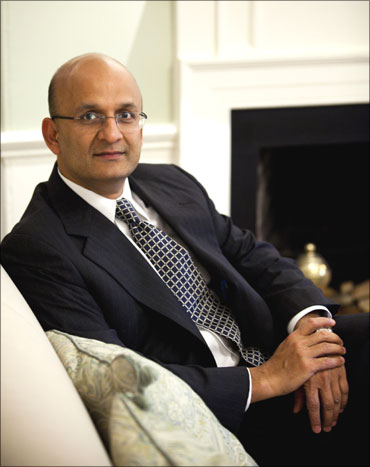
For several decades Nitin Nohria, the newly appointed dean of Harvard Business School, has known that without generosity life is greatly diminished.
"If you are generous life gives you more than you can imagine," he tells rediff.com as he discusses some of the values that have made him a renowned academic and much loved business teacher.
He was reminded of the importance of generosity as he stood by his maternal grandfather Premchand Goel's pyre many years ago. "I have learned a lot from the example of people like my grandfather," he says.
Goel, an engineer, "was not famous, did not make much money or reach the top of his profession," Nohria recalls, adding that yet the man was surrounded by loving family members and colleagues and people he had helped. He was loved and admired in life and in death.
"I have never seen such respect or love at any other funeral," Nohria adds.
Nohria, 48, the first foreign-born dean of HBS and the first Indian to head the 100-year-old institution, says that his grandfather has had a 'very powerful' impact on him.
. . .
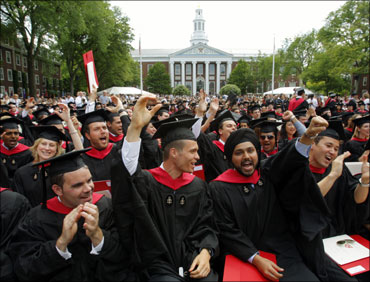
His father, Kewal Nohria, the former chairman of Crompton Greaves, has also been a very big influence, Nohria continues. He says he admired the way his father transformed barren parts of Nashik into an industrial complex. His achievements offered an example business innovations and ethics going hand in hand.
An author or co-author of more than 16 books, Nitin Nohria who has over two decades of teaching experience, says his cherished goal is to 'enable HBS to remain a beacon for business education for the next 100 years'.
Part of his mission is also to instill strong ethical values in his students which he hopes they will carry with them into the big world. He yearns for the old days when business "was done with a handshake," he said during a conference call on Thursday morning chatting with over a dozen journalists. He believes "that (old world) honor can be restored."
Though there is no magic bullet that will restore honor and responsibility in the business world, he says, he nevertheless hoped that emerging business leaders can learn from the mistakes of greedy businessmen and entrepreneurs. They (the business students) should be encouraged to believe in careers as marathons and not a sprint, he added.
As a student and teacher, he has thought about values and achievements at all times, he adds.
Prior to joining the HBS faculty in July 1988, Nohria received his Ph.D. in Management from the Sloan School of Management, Massachusetts Institute of Technology, and a B. Tech in Chemical Engineering from the Indian Institute of Technology, Bombay (which honored him as a Distinguished Alumnus in 2007).
. . .
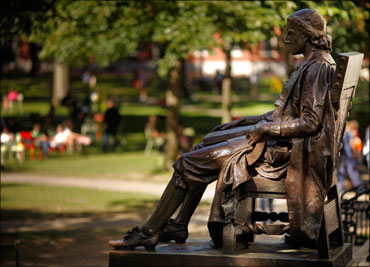
In one of his better known books Driven: How Human Nature Shapes Our Choices written with fellow Harvard Business School professor Paul R. Lawrence, the authors look at motivation and how it works.
During the interview he was reminded of the book published eight years ago and how the authors had asserted that humans possess four basic drives: to acquire, to bond, to learn, and to defend.
How have these drives influenced his own life?
He briefly talked about his accomplishments as a teacher and advisor to businesses; as for learning, he still thinks that every day he is learning something from his own experience or from people famous and little known; as for bonding, Nohria -- who lives with his wife and two daughters in the historic city of Lexington close to Boston -- says he is blessed with a wonderful family.
And since the news that he has been chosen as the HBS dean, he has realised anew the bond he has with his former and current students and many well wishers who want him to succeed more than ever before.
As for security, like every person, he also yearns, he said "that the world could be a safer place". He adds he was in Mumbai when the city was under siege in 2008 and became aware during every day of the siege how important it is to have security that protects one's achievements, learning and bonding.
. . .
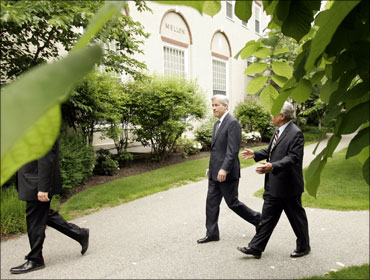
Earlier this year, he was one of four instructors from Harvard schools including Diane Eck of the Pluralism Project, who designed the workshop, Faith and Leadership in a Fragmented World.
He says the suggestion for the workshop came from Harvard president Drew Faust and the idea was to examine how one's faith informs one's "decisions and actions in public space in a secular world."
"We consider even atheism and its impact," he continues.
One of the most interesting workshops offered by any American school, the course description itself is utterly beguiling: The questions of leadership -- What am I called to do? What is my organization called to do? What we are called to do now? -- are at least as old as Moses' conversation with God at the burning bush. "Why me?" asks Moses, when called to free his people. And, "Who or what is calling me? Why these people? Who are they anyway? And, why here, now, in this place?"
'The action of leadership then is both internal and external. It requires internal exploration of values -- what matters emotionally (and so motivationally) as well as the source of those values,' the four professors wrote. 'Such internal exploration informs our capacity to make external choices and act in the world.'
For Nohria, business is a sacred activity and just as good doctors honour the Hippocratic oath, business leaders too should honor their social and ethical responsibilities.
. . .
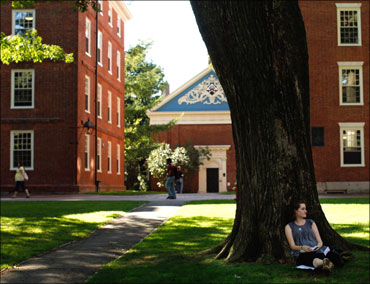
BusinessWeek said Nohria was one of the earliest management professors to suggest that students take a professional oath of conduct. He first began thinking about it during a year of teaching at the London Business School, in 1996. The publication said his sister had taken the Hippocratic Oath, and he asked students what a similar code for managers would contain, it added.
The Faith and Leadership in a Fragmented World workshop explored three dimensions of leadership, according to the course description: self-knowledge ('Who am I? What am I called to do?'); relationship to others ('Who are we? What are we called to do?'); call to action ('What do we want to contribute to the world?').
Over a course of four days, the participants examined the role of faith and spirituality in each of those dimensions.
Nohria, who has also help develop leadership and corporate accountability course at HBS, adds that one of his biggest articles of faith was that business could be made to bring about social change. His thoughts echo that of Dipak C. Jain, the former dean of Kellogg School of Management who emphasizes values and ethics in his courses and discourses with the students.
He has "deep, deep belief in business innovations" and how they can transform the world. "The vibrant, totally transformative positive role business can play excites me the most."